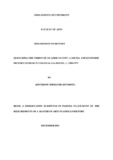Please use this identifier to cite or link to this item:
https://cris.library.msu.ac.zw//handle/11408/3644| Title: | Quenching the thirst of an African city: a social and economic history of beer in colonial Salisbury | Authors: | Ndimande, Jefferson | Keywords: | Social history Colonialism |
Issue Date: | 2018 | Publisher: | Midlands State University | Abstract: | Using a social history approach informed by the subaltern, the study explores colonialism in colonial Harare and the African experience using the lens of beer. This is achieved through employing archival sources, oral interviews, oral histories approach as well as theoretical innovations of the citizen and subject, subaltern to capture the voices of Africans. It argues that the colonial state’s attitude towards African beer wavered, vacillated and oscillated between confrontation and contempt and patronizing benevolence. Abhorrence for African beer was seen in laws and acts passed to outlaw beer, when this failed, the state moved towards accommodation and acceptance provided the terms were controlled by the state. This was achieved through adoption of the Durban System; a beer monopoly was created which criminalized African beer. The monopoly allowed the state to realise profits at the same time these sales helped build the city as social amenities such as clinics, hospitals, schools, as well as recreational facilities such as football stadium. This in turn gave birth to illegal brewing and beer becoming a site of contestation and struggle. Africans shaped beer as they brewed illicit brews such as skokiaan, made traditional brews out of sorghum and circumvented the authorities by drinking in shebeens. The history of beer is complex and goes beyond beer being consumed for social and recreational purposes, in fact as Charles Ambler and Jonathan Crush observe, ‘drinking must be conceived not simply as a weapon of domination but also as a relatively autonomous form of cultural expression- and thus a potent form of resistance. Music, entertainment, brewing of illegal brews by Africans served as ways of expression which demonstrate how beer was part of a broad discourse of struggle (s0 between the citizen and subject. | URI: | http://hdl.handle.net/11408/3644 |
| Appears in Collections: | Master Of Arts In African History Degree |
Files in This Item:
| File | Description | Size | Format | |
|---|---|---|---|---|
| MA AFRICAN HISTORY DISSERTATION .pdf | Full Text | 1.4 MB | Adobe PDF |  View/Open |
Page view(s)
182
checked on Apr 18, 2025
Download(s)
148
checked on Apr 18, 2025
Google ScholarTM
Check
Items in MSUIR are protected by copyright, with all rights reserved, unless otherwise indicated.



